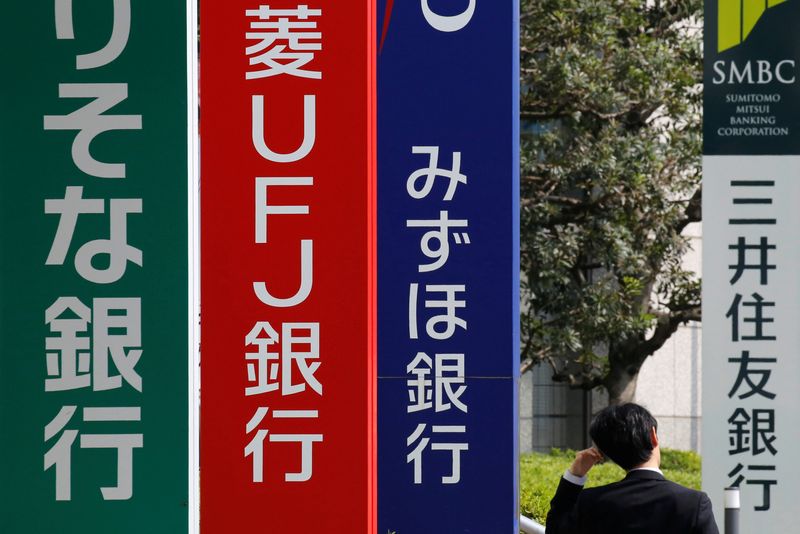By Makiko Yamazaki and Ritsuko Shimizu
TOKYO (Reuters) - After decades of deflation, Japan's economy looks poised to finally turn a corner. For its biggest banks, however, there's a hitch: a generation of professional front-line staff have little experience with rising interest rates.
Lenders in the world's third-largest economy are now giving crash courses to younger staff to help clients navigate higher interest rates as many of these employees have no expertise in dealing with the vagaries of a traditional inflation environment.
The historic shift to an inflationary environment from decades of falling prices that stretch back to the 1990s presents something of a wake-up call for Japan's major banks, senior bankers say in private, warning that lenders need to change the mindset of their staff or risk losing out on opportunities.
The last time Japan ended zero interest rates was in 2006, "so for most of our front-line bankers this is the first time to deal with clients amid rising rates," Masahiro Minami, CEO of No. 4 lender Resona Holdings, told Reuters in an interview.
"We'll need to carefully watch how our clients would change their behaviour at what speed, and we need to be prepared to respond to those changes," he said.
Hopes that banks will benefit big from an end to deflation have sent the Tokyo banking index to its highest in 15 years this year.
The industry has long moaned quietly that the central bank's massive stimulus crimped their earnings. Shackled by zero rates at home for years, big banks have expanded overseas lending and investment in complex financial products in their hunt for yields.
While it remains to be seen whether banks will be ready to capitalise on higher rates, they've been preparing for them by tapping the expertise of veteran money market specialists like Izuru Kato.
Kato, who heads the think-tank arm of major money market brokerage Tokyo Tanshi, has been called upon frequently by various banks, sometimes multiple times a week, to talk how short-term money market was before the Bank of Japan's monetary easing steps and how it would be when these steps are removed.
"Requests from banks for such meetings or seminars started to come about a year ago, but the number has surged since October," when the BOJ further loosened its grip on long-term interest rates, he said.
STUDY SESSIONS, SEMINARS
MUFG Bank, Mitsubishi UFJ (NYSE:MUFG) Financial Group's core banking unit, has held more than 70 study sessions for front-line bankers this year on how to support clients when interest rates swing.
The top Japanese lender also set up a sales support team in April for yen interest rate derivatives, a product likely to see an upswing in demand in an inflationary environment.
In June, it started an internal messaging channel to deliver yen interest rate-related sales and market information to about 1,200 bankers subscribing to it. It also plans to offer crash courses to new graduates starting their career in April.
Similarly, Resona in recent months held online seminars for hundreds of managers, mainly branch chiefs, to help them brush up how higher interest would impact balance sheets of their clients and their own, with the idea that they would then go back to their branches and pass on the information.
Among investment banks, Daiwa Securities created a new department within its trading division in April. The 38 members, which include credit dealers and data scientists, work to improve coordination between retail and wholesale divisions, as higher rates are expected to fuel trading activities.
"Japan is at a turning point for the first time in 30 years," Satoru Yamamoto, the head of the new department told Reuters. "As the yen interest rate environment normalises, it would be natural for us as a Japanese brokerage house to shift focus to our main home-country products - Japanese stocks and bonds."
Atsushi Kikuchi, an executive at Mizuho Financial Group's trust banking arm, said he already sees his pension fund clients adjusting their investment portfolios, coming back to long overlooked yen-denominated bonds from once popular currency-hedged foreign bonds.
The banks declined to say how much they were spending.
"I'm feeling pretty excited because the healthy rate environment creates various opportunities for us," said one Mizuho banker in his 30s.
Still, if higher rates are new to most bankers, so they are for their clients, who have for years enjoyed rock bottom rates in Japan.
Tokyo Tanshi's Kato, the money market veteran, said Japan's overbanking problem, with excess banking capacity, could make it difficult for banks in highly competitive regions to reflect changes in policy rates on their lending rates.
"Almost no front-line bankers have experienced short-term rates above 0.5% as Japan last saw such rates in the 1990s," he said. "I think there are a lot of scepticism among front-line bankers over whether they can really increase their lending rates."
